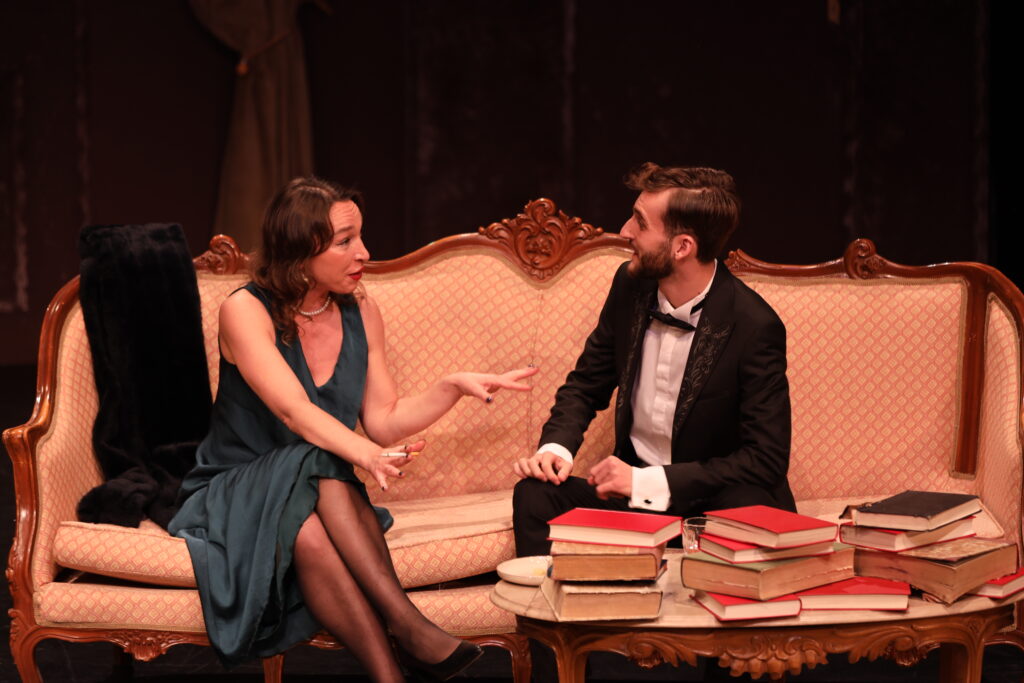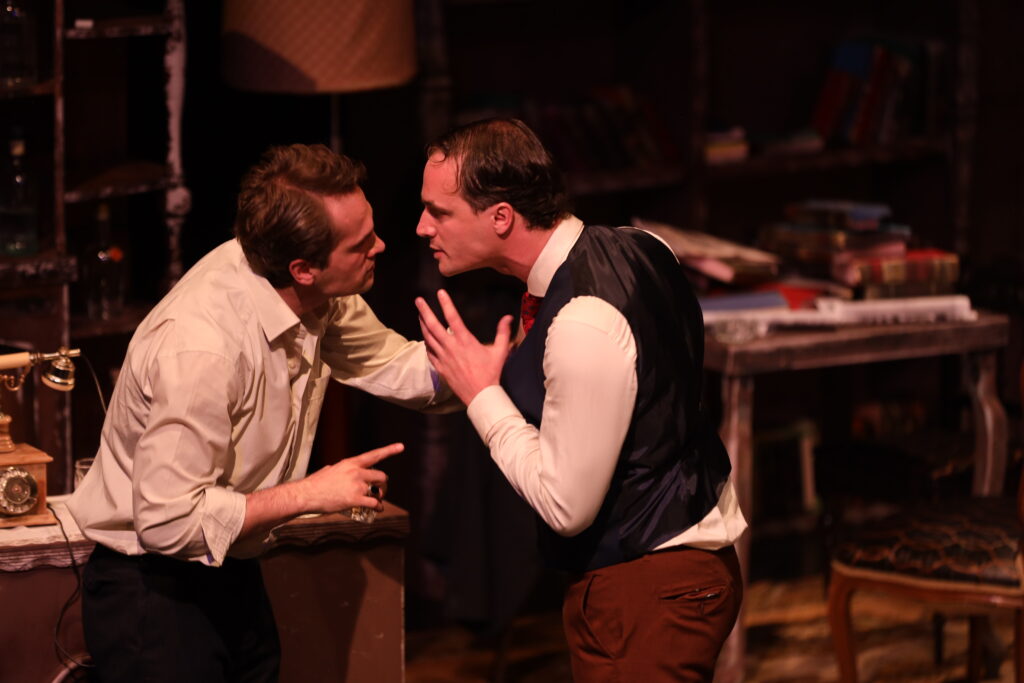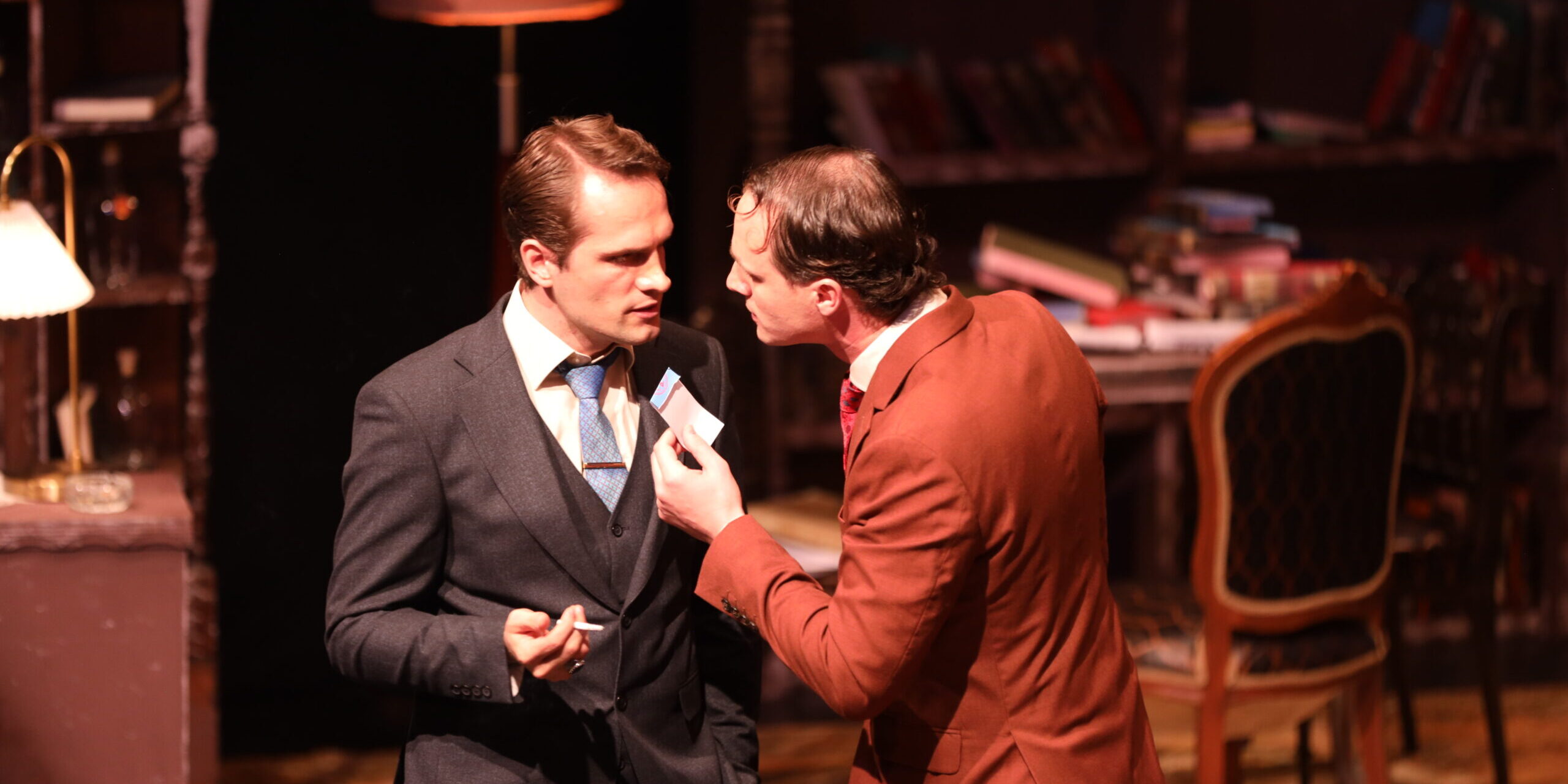National Theater Kosovo, premiere 12th November 2025
Written by British novelist and playwright Patrick Hamilton in 1929, Rope was inspired by the real-life Leopold and Loeb case in the US, in which two young men murdered a 14-year-old.
Scenographer Mentor Berisha’s set is dominated by a giant window through which rain is drizzling against a twilight sky. It is a typical London evening, the dark salon shrouded in shadow. Through the murk we see two men close the lid of a large chest in unison, breathing heavily with the effort. While Charles Granillo (Valmir Krasniqi) seems shocked at what they have done, his response is in stark contrast to his friend Wyndham Brandon (Allmir Suhodolli), who seems calm and composed. ‘Don’t fuss Grano’, he quips. ‘We killed a man with a rope… so what?’
It is revealed that the two men have taken the life of their friend Ronald Kentley for no apparent reason. With Kentley’s still-warm body concealed in the trunk, they turn their attention to more important matters: the dinner party they are hosting for their society friends. The guests include the father of the dead boy, Sir Johnstone Kentley. With every utterance, Suhodolli’s Brandon exudes a sense of moral and intellectual superiority, a sense that he has the right to do anything he pleases.

Rope, National Theatre of Kosovo
The first guests to arrive are cheerful socialite Leyla Arden (Arta Selimi) and naïve but sweet Kenneth Raglan (Rrezon Zhinipotoku), who immediately hit it off with their shared love of moving pictures. Sir Johnstone Kentley (Selman Lokaj) is literature afficionado, who is eager to examine rare books promised to him by Brandon. He is accompanied by his sister, Mrs. Debenham (Lumnije Sopi), a prim and proper lady of few words. The circle of carefully hand-picked intellectuals is completed with the young men’s former professor, Rupert Cadell (Shkëlzen Veseli), a confident and spirited figure, proudly leaning on his cane.
The housekeeper (Semira Latifi) proceeds to serve dinner on the chest, which unbeknownst to the guests conceals the dead body. Throughout this macabre meal, a smug smile never leaves Suhodolli’s face. Beneath the society chatter, director Skënder Podvorica maintains a sense of tension, a balance between the frivolous and sinister.
The tension is increased when the guests start wondering about the chest. Lady Arden jokes that it probably holds the body of someone killed by their hosts, an idea that everyone finds hilarious. A real murderer would never be so stupid, they laugh. After drinks and dancing, Brandon presents Sir Kentley with the rare books from his library and Lady Arden asks for a rope to tie them together. The word ‘rope’ strikes a chord with the guilty hosts, who freeze at its mention. The moment when she ties up the books with the rope used to murder the young man in the chest is particularly grisly. The sense of conviviality falls away and we are reminded of the true horror of what has taken place. Professor Cadell observes all this with a sense of a man who knows something of life and death, having taken lives during the war, but he wisely conceals his rising doubts about his former students’ behavior.
As the party nears its end, Suhodolli and Krasniqi convey the men’s sense of liberation at having gotten away with the crime. The secret further seals their bond and they look into each other’s eyes with contained affection. (The relationship between the two young men is, to a greater or lesser extent, often depicted as having a sexual element). But Cadell sees through them and returns.
Throughout the play, Berisha’s scenography plays a key part in creating tension. The initial drizzle turns into a downpour and there are thunderclaps at critical moments. The salon setting, with its wooden furniture and decadent floor lamps, bookshelves and a full bar, adds to the stylish 1920s atmosphere.
For the two young men, murder seems to be a way to fill the emptiness that comes with having everything. They see crime as an art form. With the utmost ease they pass judgment and mock others for not being cultured enough, to the point of determining their lives are useless. Their arguments are palpably horrifying, especially when they try to justify their superiority and brand their act one of bravery. They believe themselves untouchable.

Rope, National Theatre of Kosovo
Suhodolli plays Brandon with an elegance and grace that causes a kind of amnesia – it’s all too easy to forget he is a murderer. This is enhanced by his impeccable posture, dashing brown three-piece suit (care of costume designer Yllka Brada) and stylish hairdo. As played by Krasniqi, Granillo is more discombobulated and fragile, the one more likely to shatter once the truth comes out. Feeling pangs of guilt, he drinks himself into oblivion and simply folds into silence at the end. As Cadell, Veseli gives the stand-out performance, bringing gentlemanly ease, sophistication, and wit to the role. At the same time, his character is grounded and humane as he realizes the dark truth. His delivery is arresting, and he leaves us wanting more. Semira Latifi, Arta Selimi and Rrezon Zhinipotoku acquit themselves the smaller roles, and the latter two have a joyous chemistry as Lady Arden and Raglan. The whole cast work together well as an ensemble making for a very smooth performance.
Hamilton’s play, in which two entitled, snobbish boys glory in the hunt and see murder as the ultimate ‘intellectual pastime,’ still feels resonant. Donna Tartt’s novel The Secret History, a tale of spoiled and wealthy college grads who delight in playing God, feels like it owes it a debt and a remake is said to be in the works, based on Hitchcock’s famous 1946 film of the play which relocated it to the US.
Cadell’s words lay it out plainly, ‘if you believe that life is just a bad joke, then you will enjoy seeing the joke played on you’. The play demonstrates that there will always be consequences. If only in conscience.
Credits:
Author: Patrick Hamilton// Director: Skënder Podvorica// Dramaturg: Zoga Çeta Çitaku// Scenography: Mentor Berisha// Composer: Enrico Vitali & Serena Abrami// Costumes: Yllka Brada//Video and special effects: Florian Canga// Adaptation: Albin Kushnini// Translator: Eneida Gjonbalaj// Lights: Mursel Bekteshi
Cast:
Cast: Allmir Suhodolli, Valmir Krasniqi, Semira Latifi,Rrezon Zhinipotoku, Shkëlzen Veseli, Arta Selimi, Selman Lokaj, Lumnije Sopi
Bora Shpuza is a literary translator and freelance art reviewer based in Prishtina,








